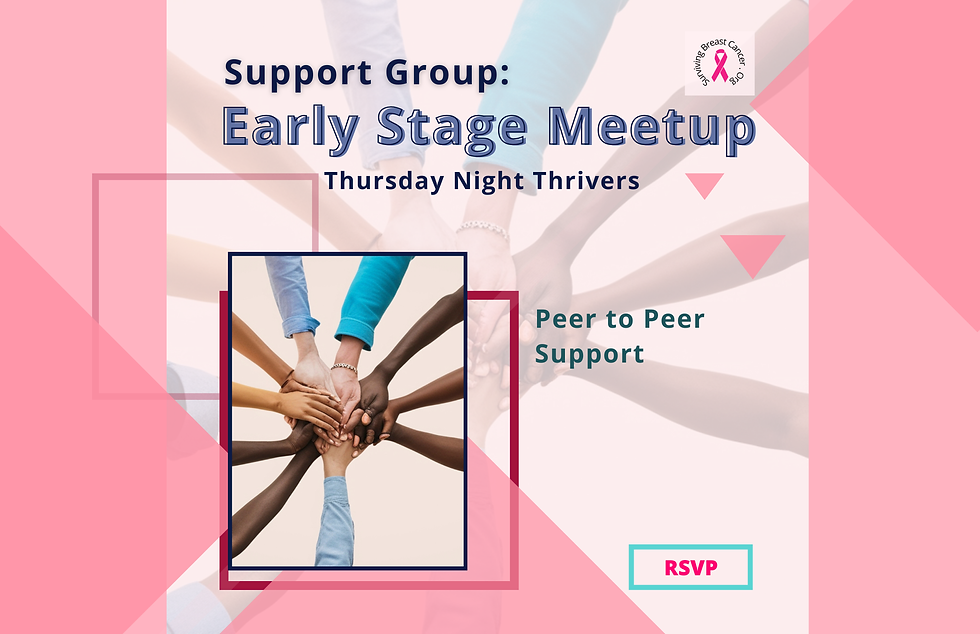Reclaiming Intimacy: Supporting Sexual Health and Relationships After Cancer
- Surviving Breast Cancer

- Jul 10, 2025
- 3 min read
Updated: Sep 23, 2025
By Laura Carfang

A cancer diagnosis is life-changing. For individuals navigating breast cancer, the focus often centers on survival—completing treatment, managing side effects, and getting back to “normal.” Unfortunately, for many survivors, what follows is far from familiar. The emotional, physical, and relational impacts of cancer can linger long after treatment ends, especially when it comes to sexual health and intimacy.
The Silent Struggle of Sexual Health Post-Cancer
Breast cancer treatments such as chemotherapy, radiation, hormone therapy, and surgeries like lumpectomies or mastectomies can have profound and lasting effects on a person’s body and self-image. Additionally, people may experience fatigue, joint pain, scarring, or premature menopause, all of which can contribute to a decrease in sexual desire and satisfaction. Equally as impactful are the emotional scars; feelings of vulnerability, grief, or anxiety about being desirable or worthy of love.
This often-overlooked aspect of survivorship deserves more attention. People diagnosed with breast cancer are frequently left to cope with these changes in silence, uncertain how they can talk about their experiences with healthcare providers, partners, or even themselves.
Hormones, Identity, and Emotional Well-Being
Hormonal treatments used to reduce the risk of cancer recurrence can abruptly induce menopause, even in younger patients. Sudden hormonal changes can affect not just vaginal dryness and libido, but also mood, mental clarity, and emotional resilience. The result is a complex interplay of physical symptoms and psychological shifts that many are unprepared for.
Many individuals describe this experience as a loss of identity where the person they knew in the mirror feels unfamiliar. These changes can deeply affect confidence, especially when re-entering intimate relationships or dating post-treatment. For partners, it can also shift the dynamics of a long-standing relationship, leaving both individuals unsure how to reconnect.
The Power of Support and Communication
One of the most effective ways to navigate this new terrain is through open communication—both with oneself and with partners. Survivors and thrivers can find comfort and strength in talking to partners about their changing needs, fears, and desires. Emotional intimacy—feeling seen, heard, and valued—lays the groundwork for physical closeness to return on new terms.
Supportive partners can play a crucial role in the healing process. Gestures of care, empathy, and acceptance, like offering comfort during hair loss or affirming beauty beyond scars, can be deeply meaningful. However, these conversations don’t always happen organically, and many survivors benefit from structured support like therapy, couples counseling, or peer-led support groups.
Healthcare professionals also have a responsibility to initiate and normalize discussions about sexual health. Too often, these conversations are left out of survivorship care. Providing education about what to expect physically and emotionally during and/or after cancer treatment empowers patients to prepare for and navigate what’s ahead.
Breaking the Silence, Finding Community
Sexual health during and after cancer is not a niche concern—it’s a central component of healing and quality of life. Those diagnosed with cancer deserve access to evidence-based resources, compassionate care, and community spaces where they can share their stories without shame or stigma.
Whether you’re in a new relationship, rebuilding a connection with a long-time partner, or rediscovering your relationship with your own body, know that you are not alone. Sexual health is a valid and vital part of your recovery. It’s okay to seek support. It’s okay to grieve, and it’s okay to hope for joy, closeness, and connection again.
Note: This article offers general information and does not replace professional medical advice. Make sure to discuss your options with your healthcare provider.
Read More:
On the Podcast: Breast Cancer Conversations
Rebuilding Intimacy Post-Diagnosis: A Conversation on Sexual Health and Relationships with Tiffini Sharifi
Share your story, poetry, or art:
SurvivingBreastCancer.org Resources & Support:










